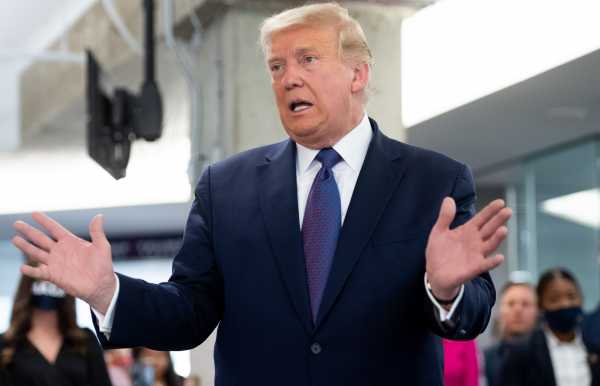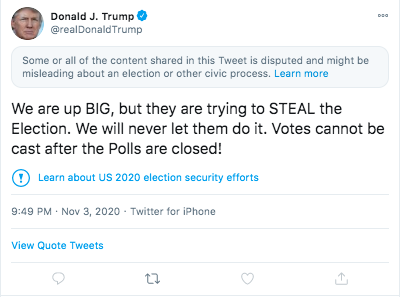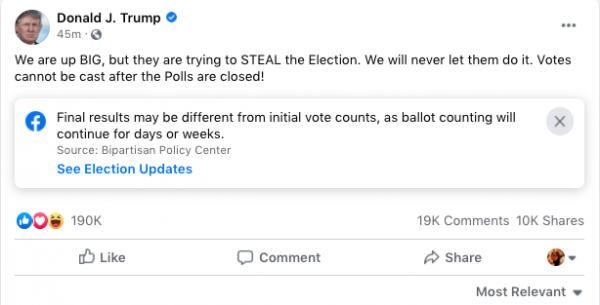
This story is part of a group of stories called

Uncovering and explaining how our digital world is changing — and changing us.
Twitter and Facebook both labeled a post President Trump shared at the end of Election Day in which he baselessly said the election is being “stolen” from him. Twitter took more aggressive action by warning users that the post is “potentially misleading” and slowing its reach; Facebook posted a label saying that ballots could take days or weeks to count.
In fact, it’s standard process in the United States for votes to be counted well after election night, and that’s even more anticipated this year given the record volume of mail-in ballots due to people staying at home during the Covid-19 pandemic.
Democrats had been worried about this very scenario — that Trump would declare a premature victory via social media — for months leading up to the election, and had been pressing social media companies for more details on how they would respond. Trump’s posts come ahead of a speech he’s expected to give on broadcast television, in which major networks have said they would fact-check false claims by Trump in near real time.
Just as Democratic presidential candidate Joe Biden was finishing his televised speech to say that he thinks he’s “on track” to win the election, Trump posted on his Facebook and Twitter accounts claims that “We are up BIG, but they are trying to “STEAL” the Election. We will never let them do it. Votes cannot be cast after the Poles [sic] are closed!”

A few minutes after Trump posted this, it appears that his account deleted and reposted the tweet after fixing a spelling error; his first tweet had spelled it as “Poles.” Regardless, Twitter labeled the spell-checked version of Trump’s tweet with a warning label for violating its policies against civic integrity. Twitter’s label covered the content of Trump’s tweet — so that you can only see the actual post if you click in to a note that says the content in the tweet is “disputed” and “might be misleading about an election or other civic process.” Twitter has seemingly also prevented users from replying to, liking, or sharing the tweet without comment.
Shortly after Twitter moderated Trump’s post, Facebook also labeled Trump’s identical post on Facebook with a less prominent warning label stating that “Final results may be different from initial vote counts, as ballot counting will continue for days or weeks,” and a link to voting information. Unlike Twitter, Facebook has not limited people’s ability to reply to or share the post.

Once again, it seems that Twitter took the lead over Facebook in more decisively moderating Trump’s comments. But as Trump continues to comment on the results of an incomplete election in which key battleground states are expected to spend the next few days or more finalizing their counts, both companies will likely keep having to deal with these kinds of unproven claims about the results of the election.
Will you help keep Vox free for all?
The United States is in the middle of one of the most consequential presidential elections of our lifetimes. It’s essential that all Americans are able to access clear, concise information on what the outcome of the election could mean for their lives, and the lives of their families and communities. That is our mission at Vox. But our distinctive brand of explanatory journalism takes resources. Even when the economy and the news advertising market recovers, your support will be a critical part of sustaining our resource-intensive work. If you have already contributed, thank you. If you haven’t, please consider helping everyone understand this presidential election: Contribute today from as little as $3.
Sourse: vox.com





